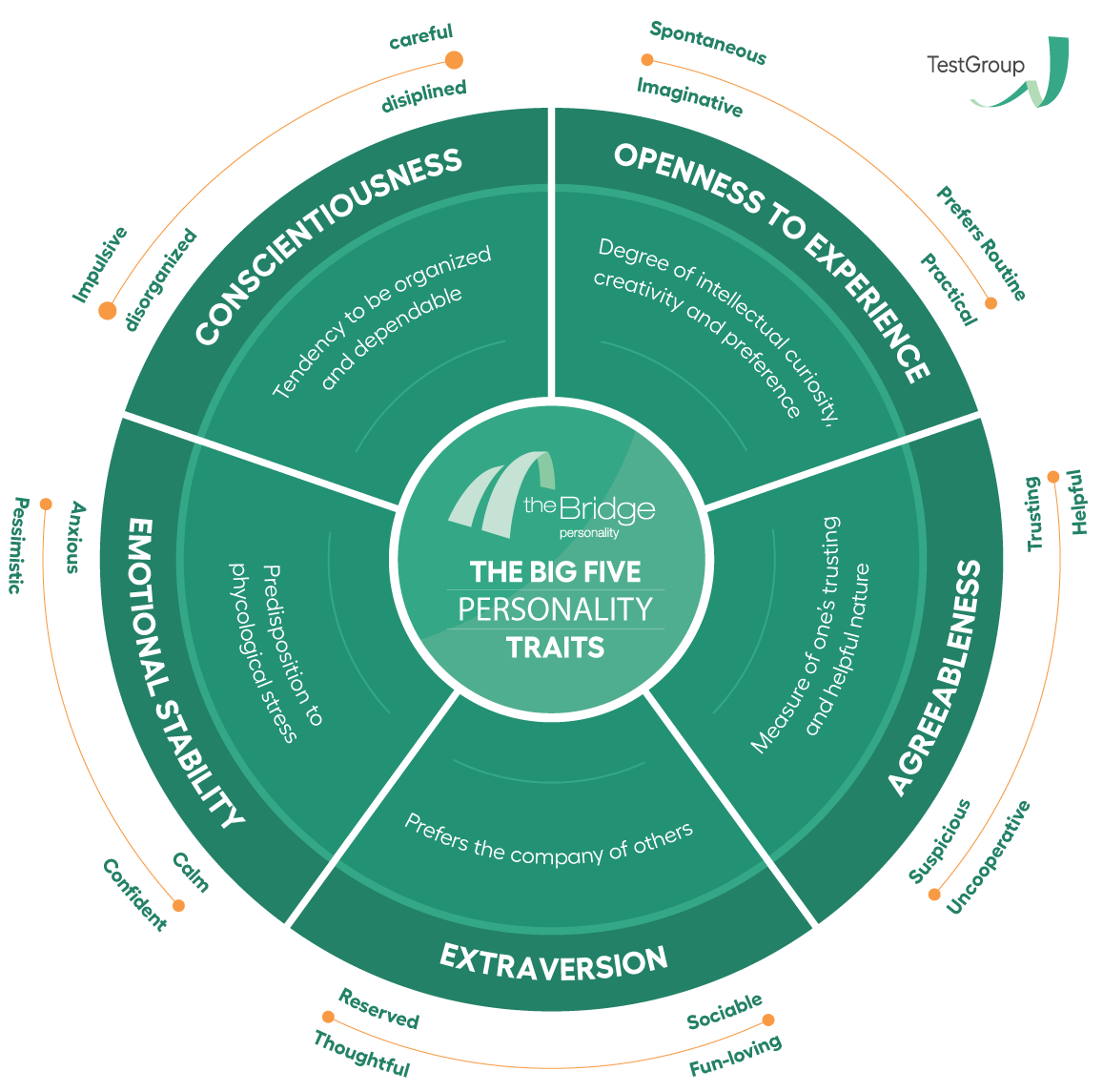Big Five personality test: Emotional Stability
The Bridge Personality has been the most widely used Big Five personality test by companies and organizations in many countries worldwide for 15 years. This test, based on the Big Five theory, is generally considered the ultimate personality test for recruitment and selection purposes. The theory emphasizes that personality is composed of five primary traits, known as the Big Five, which together form the five personality factors.
This Big Five personality test can be ordered individually for each candidate or as part of a cost-effective assessment subscription, allowing you to manage the test yourself.
The scientifically constructed Big Five personality test measures the five fundamental dimensions of personality: Openness to Experience, Conscientiousness, Extraversion, Agreeableness, and Emotional Stability, often referred to as the Big Five. The five-factor model, also known as the OCEAN model, is widely used in selecting the right candidates due to its scientific validity.

What is The Big Five personality trait: Emotional Stability?
Emotional Stability, the opposite of the ‘Neuroticism’ trait in the Big Five personality test, gauges a person's ability to remain calm, composed, and emotionally consistent. High scorers in Emotional Stability (meaning low in Neuroticism) typically maintain their calm during stressful situations, experience fewer mood swings, and exhibit less negative emotionality. Conversely, those with low Emotional Stability (high Neuroticism) are more prone to emotional outbursts and struggle to manage their emotions in challenging times. Being highly emotionally stable is associated with greater life and job satisfaction and reduced stress levels. People with this trait are also more adept at handling workplace pressures and adapting to rapid changes.
The science of Emotional Stability
The Big Five personality trait of Emotional Stability, often framed as its inverse, Neuroticism, has been extensively studied within the field of psychology. This trait assesses an individual's tendency towards emotional regulation, calmness, and resilience in the face of stress. Seminal research by Costa and McCrae with the development of the NEO Personality Inventory significantly advanced the understanding of Emotional Stability, highlighting its role in psychological well-being and its inverse relationship with neurotic tendencies (Costa & McCrae, 1992).
Eysenck’s earlier theories, particularly his dimensional model of personality, laid the groundwork for this understanding, linking neuroticism with emotional instability and vulnerability to psychological distress (Eysenck, 1967). Subsequent research has consistently found that high Emotional Stability (low Neuroticism) correlates with better mental health, lower stress levels, and greater life satisfaction (Digman, 1990; John, Naumann, & Soto, 2008). This trait has been a focus in studies exploring the genetic and neurobiological underpinnings of personality, further elucidating its basis in individual differences (DeYoung, 2010; Canli, 2008). Collectively, this research underscores Emotional Stability as a critical dimension of personality, influencing an individual's overall psychological health and response to stress.
Which Big Five personality test facets measure Emotional Stability?
The Big Five personality test measures 34 personality facets that are linked to the Big Five personality traits. The facets that measure Emotional Stability are:
The Bridge Tests & Online Assessments
TestGroup is the official provider of the renowned Bridge tests and online assessments, which are high-quality, scientifically validated psychometric tools used globally. Developed in collaboration with universities around the world, these assessments predict workplace behavior through personality tests, cognitive ability evaluations, and career assessments. We assist organizations globally in using online assessments.















